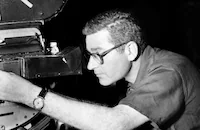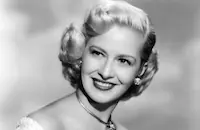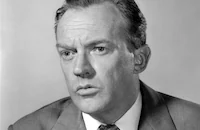Champion

Brief Synopsis
Cast & Crew
Mark Robson
Kirk Douglas
Marilyn Maxwell
Arthur Kennedy
Paul Stewart
Ruth Roman
Film Details
Technical Specs

Synopsis
As popular champion boxer Midge Kelly enters the ring to defend his title, his career is recalled: While riding a railroad boxcar toward California, where they have bought a third interest in a diner, Midge and his partially disabled brother Connie are robbed and ejected from the train. The next morning, Midge and Connie meet boxer Johnny Dunne and his girl friend, Grace Diamond, who give them a ride to Kansas City. When they arrive there, Dunne suggests that they could get jobs as concession salesmen at his fight that night. However, the refreshment manager does not want them and, when he calls Connie "gimp," Midge attacks him. Meanwhile, promoter Hammond learns that one of his boxers cannot fight due to an injury and realizes that Midge could be a substitute fighter in a bout in which he will be "carried" by his opponent. Hammond promises Midge thirty-five dollars and he survives a beating for the four-round bout. After the fight, Los Angeles manager Tommy Haley approaches Midge and offers to manage him, stating that while Midge has no great boxing ability, he does have "guts." Midge declines the offer and he and Connie eventually reach the diner in Malibu. They soon discover that their "partner" did not own the diner but was merely an employee, and has since been fired by owner Lew Bryce. Lew nonetheless hires Midge and Connie and gives them room and board, but warns them to stay away from his daughter Emma, who works as his waitress. Later, however, Midge invites Emma for a swim after work and a romance develops. When Emma brings up the subject of marriage, she discovers that Midge is not considering it, as he cannot support her. However, Lew discovers them together and, at gunpoint, forces them to marry. Immediately thereafter, Midge leaves with Connie. Needing work, they find the now retired Haley at a gym, and although he warns them about the dangers of the boxing business, Midge persuades Haley to become his manager. In his first fight, the well-trained Midge easily knocks out his opponent. Connie does not like Midge's new brutal and ambitious behavior and suggests that he quit, but Midge will not consider that. After several more successful fights, Midge buys an apartment for his mother and, over the next two years, works his way up the rankings until he earns a chance to fight the number one contender, Johnny Dunne. Haley then tells him that he must lose to Dunne, who will then go on to take the title, but that in a year or so, he will get a legitimate shot at the championship. Midge agrees to go along, but knocks Dunne out in the first round. After the fight, Midge, Connie and Haley are attacked by several thugs working for the gamblers who control the boxing racket. Later, Midge receives a phone call from the gold-digging Grace, who has decided to switch her affections to him. Unknown to Midge, she is working for Dunne's manager, impresario Jerome Harris, and assures him that she can persuade Midge to change managers. Grace then plays "hard-to-get" with Midge, but offers to stay with him if he drops Haley as his manager. When he does so, both Haley and Connie are disappointed and Connie walks out. Later, Connie goes looking for Emma and finds her working as a cocktail waitress. She has not divorced Midge and tells Connie that she is still interested in him and agrees to accompany Connie to Chicago to see his ailing mother. After Midge becomes the new champion, he begins an affair with Harris' wife Palmer, an amateur sculptor. Jealous, Grace insists that Midge marry her, but he tells her that he already has a wife. In Chicago, meanwhile, Emma realizes that she no longer loves Midge and now is in love with Connie. Midge learns from Harris, to whom he owes a lot of money, that he is to defend his title against Dunne, who has made a great comeback. Harris offers to forgive Midge's debt, tear up their contract and give him the entire purse from the fight, but only if he agrees to stop his affair with Palmer. When Midge accepts, Palmer is disillusioned. After Midge learns that his mother is dying, he asks Haley to train him for the fight, and Haley agrees to return in exchange for a third share. Midge then heads for Chicago, but arrives too late to see his mother. When Connie tells him that he and Emma intend to get married, Midge appears to be pleased and asks Connie to come back and help him prepare for the fight. At the training camp, however, Midge forces himself on Emma. Just before the fight, Connie tells Midge that Emma has left and that he stinks from corruption, then hits him. Midge slugs him back, but Connie recovers and goes to watch the fight. Dunne suffers an early knockdown, but revives and takes control of the fight. Although Midge is knocked down twice and suffers a badly cut eye, he refuses to throw in the towel and manages to knock out Dunne and retain the championship. In the dressing room, Midge is obviously punchy and imagines that he is back at the start of his boxing career, then collapses. Emma arrives at the arena in time to hear Haley announce to the press that Midge has died of a brain hemorrhage. Before walking off with Emma, Connie dourly informs the reporters, "He was a champion. He went out like a champion. He was a credit to the fight game to the very end."

Director

Mark Robson
Cast

Kirk Douglas

Marilyn Maxwell

Arthur Kennedy

Paul Stewart

Ruth Roman

Lola Albright
Luis Van Rooten
Harry Shannon
Ralph Sanford
Esther Howard

Polly Bergen
Crew
Clem Beauchamp
Edward G. Boyle
Mushy Callahan
Perry Finnerman
Carl Foreman
Harry Gerstad
"goldie" Goldmark
Ace Hudkins
Joe King
Stanley Kramer
Gus Norin
Adele Parmenter
Frank Planer
Tom Quellette
Dave Ragin
Morris Rosen
Jean Speak
Rudolph Sternad
Robert Stillman
Dimitri Tiomkin
Dimitri Tiomkin
Ivan Volkman
Don Weis
Scotty Welbourne
Gertrude Wheeler

Film Details
Technical Specs

Award Wins
Best Editing
Award Nominations
Best Actor
Best Cinematography
Best Music, Original or Comedy Series
Best Supporting Actor
Best Writing, Screenplay
Articles
Champion
Champion opens with war veteran Midge Kelly (Kirk Douglas) planning to open a diner with his handicapped brother Connie (Arthur Kennedy). While hitchhiking the two men encounter Johnny Dunne (John Day), a small-time boxer, and his flashy girlfriend Grace (Marilyn Maxwell), who persuade Midge to enter the ring to earn some extra money for the diner. At first he only sees boxing as a short term financial opportunity but soon he's hooked by his success and slowly slides into a spiral of con games, seduction, betrayal and violence.
Producer Stanley Kramer bought the rights to a few Ring Lardner, Jr. stories and in 1948 filmed one as So This Is New York. That wasn't a big success but it didn't stop him from working on the next Lardner adaptation because he believed in it so strongly. In his autobiography, It's a Mad, Mad, Mad, Mad World (Harcourt Brace & Co.), Kramer said he intended Champion to "be the first film to show the fight game as it really was: brutal and corrupt. My attraction to this story grew out of what I'd seen as a kid growing up on the streets of New York. It seems as if half the kids with whom I had run around in the slums of Hell's Kitchen had become professional fighters....They fought because it seemed like a way to make some quick, easy money, but every one of them was sorry before he was finished. First of all, they didn't make any money. They would take a fight for $80. The manager grabbed $40 of that, and the trainer $25. The boy was fighting for $15, often taking a torturous beating." For his film, Kramer found financing from a Florida clothing manufacturer and a California lettuce grower before signing on writer Carl Foreman and director Mark Robson. But he still lacked an actor for the lead role.
Kirk Douglas was a rising but still little-known actor who felt that his career was stalling so he took a chance on this obscure independent producer, foregoing an offered role in the big-budget MGM film The Great Sinner (1949). Instead of taking a secondary role to Gregory Peck and Ava Gardner in that film, Douglas ended up with an Oscar nomination for Best Actor and star status when Champion turned out to be a bigger hit than anybody had anticipated.
In his autobiography, The Ragman's Son, Douglas recalled that prior to being cast in Champion, Kramer and Carl Foreman did have some reservations about his acting. "They'd seen my performance as the weak district attorney in The Strange Love of Martha Ivers [1946], and as the sensitive schoolteacher in A Letter to Three Wives [1949]. Now, although they were trying to be delicate about it, they were wondering whether I could play a boxer. I finally realized what they wanted. I thought, This is what the starlets do. I took off my jacket and shirt, bared my chest and flexed my muscles. They nodded approvingly, satisfied that I could play a boxer. I was probably the only man in Hollywood who's had to strip to get a part. I didn't want to use a body double, so I worked out....Mushy Callahan, the ex-welterweight champ, taught me how to punch the speed bag and the hard bag. We developed a boxing style suitable for my character: always moving forward, no matter how many times or how hard I got hit. Even when I got smashed in the face, I kept moving in. I was relentless. Many of the boxers I fought in the picture were real life ex-pugs."
One thing that Douglas doesn't mention in his autobiography is that he had some plastic surgery on his face just before filming began on Champion. Kramer was incredulous: "You mean to say you had a nose job just when you're about to making a boxing picture?" Apparently, Douglas felt some slight cosmetic changes to his face would make him a more attractive leading man. At any rate, Kramer stated, "there was little choice but to continue with him and figure out some way to protect that infernal nose....we made sure they [the boxers] were serious about only one thing - avoiding contact with his nose....Douglas had to suffer some hard body blows as a result, but his nose remained intact." Their careful maneuvering paid off, for the boxing matches in the film are brutally realistic and even sports writers found little to criticize in the sequences.
When Champion opened theatrically, it grossed almost $18 million (an impressive sum considering its modest budget), made Kramer one of the most sought-after producers in Hollywood and transformed Douglas into an overnight star. In fact, Douglas's performance was an inspiration to Shirley MacLaine, who later told the actor that his cruel kiss-off scene with Marilyn Maxwell inspired her to become an actress. In 1999, clips from Champion's boxing scenes would be used as flashbacks for Douglas' character in the film Diamonds.
Producer: Stanley Kramer
Director: Mark Robson
Screenplay: Carl Foreman, based on the story by Ring Lardner, Jr.
Cinematography: Franz Planer
Editing: Harry Gerstad
Music: Dimitri Tiomkin
Cast: Kirk Douglas (Midge Kelly), Marilyn Maxwell (Grace Diamond), Arthur Kennedy (Connie Kelly), Paul Stewart (Tommy Haley), Ruth Roman (Emma Bryce).
BW-100m. Closed captioning.
by Lang Thompson

Champion
Quotes
This is a celebration. Midge is getting a shot at the title, and he's got a new manager... a blonde.- Tommy Haley
You know what a "Golem" is? I think I knew all the time I was building one.- Tommy Haley
Oh, this rotten business!- Connie Kelly
Awww, lay off the business. It's like any other business, only here the blood shows.- Michael 'Midge' Kelly
Trivia
Notes
A January 1949 New York Times news item reported that producer Stanley Kramer had made Champion in twenty-four days for a modest $595,000 as a result of extensive pre-production rehearsal and preparation. According to Kramer, this preparation saved him fourteen days of shooting and at least $150,000. Kirk Douglas was nominated for an Academy Award for Best Actor for his performance. The film won an Oscar for Editing and also received nominations for Best Supporting Actor (Arthur Kennedy), Black and White Cinematography, Screenplay and Music. According to a June 1949 Am Cin article, the diner scenes were shot in an actual diner in Santa Monica, CA. As noted in a March 1949 Daily Variety item, just before Champion was to open, RKO obtained an injunction against the film, claiming that it "was copied largely from and based upon" their film The Set-Up. For a full account of this litigation, please see the entry below for The Set-Up.

Miscellaneous Notes
Released in United States May 20, 1949
Released in United States on Video September 1987
Released in United States Winter January 1, 1949
Released in United States Winter January 1, 1949
Released in United States May 20, 1949
Released in United States on Video September 1987














